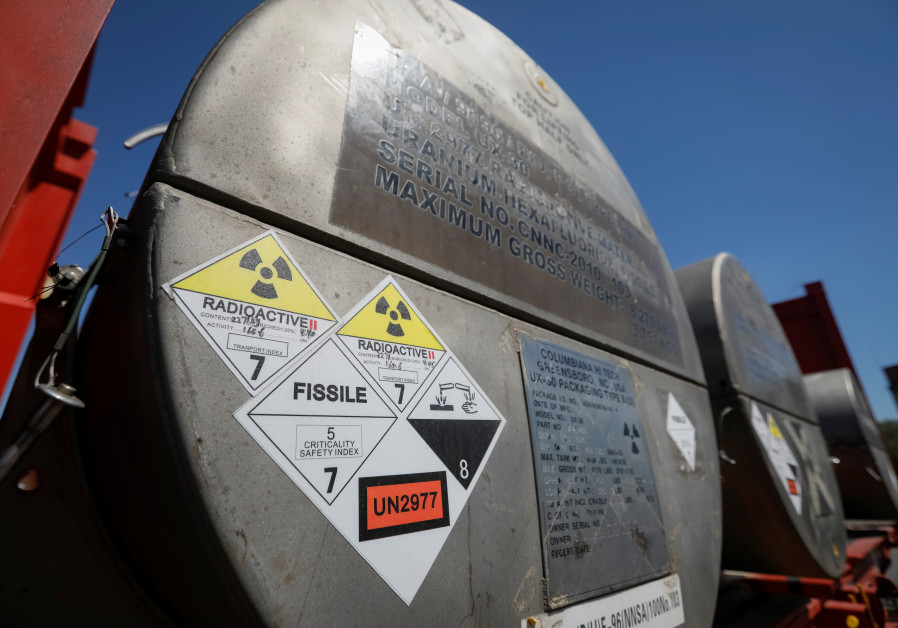INSS expert: Distracted IAEA could be less focused on Iran

A view shows railway packages for containers with uranium hexafluoride salt, raw material for nuclear reactors, similar to the one be used for the IAEA Low Enriched Uranium (LEU) Bank. (photo credit: SHAMIL ZHUMATOV / REUTERS)
An IAEA distracted by the process of selecting a successor for director-general Yukiya Amano may end up being weaker on dealing with Iranian nuclear violations, INSS Arms Control director Emily Landau told The Jerusalem Post on Thursday.
On Wednesday, Reuters reported that Amano will be stepping down in March 2020 and that a process to select his successor has already started.
Reportedly, Amano is stepping down years before his term ends due to health problems that have already started to hamper his ability to attend various meetings and carry out certain roles.
Landau was expressing concern that while the IAEA has no real leader, it will have less stomach for pressuring Tehran to stick to the 2015 nuclear deal.
The INSS expert said that, “In some respects, the director-general of the IAEA can make a difference. We saw this very clearly when Amano first took over from Mohammed El-Baradei.”
She noted that under El-Baradei, the IAEA had been withholding from the public a special annex regarding Iran’s past possible nuclear military dimensions for years “for political reasons.”
El-Baradei was concerned that if he published the annex report, “Israel might view it as a pretext for attacking Iran. El-Baradei was clearly making decisions not merely on technical grounds. It is a technical organization. It is not the place of the IAEA to include such political considerations. When Amano took over,” the annex was published within a short time.
However, at the end of the day, she said that who fills the role of director-general will likely never address, “the problems with the IAEA that are more deeply ingrained in the organizational culture.”
According to Landau, “The problems go back to the mandate the IAEA originally received per the NPT [Nuclear Non-Proliferation Treaty]. Each state that joins the NPT as a non-nuclear state must sign a Safeguard Agreement with the IAEA.”
Next, she said that, “because at the beginning [of the IAEA] no real attention was given to [the idea] that states might join the treaty and then proceed to undermine it by violating it,” the IAEA has never been prepared to go after states for cheating.
In other words, the founders of the IAEA divided the world mostly into bad states who would not join and good states who would join, without considering that bad states might join and lie.
She said that the IAEA’s mandate is basically just “to ensure everything is okay… with the assumption that they probably are,” which leaves it unprepared to deal with violators.
Landau agreed with a premise that, in theory, a new director-general might be less invested in the Iran deal than Amano – who has been one of the deal’s biggest sponsors and proponents – but again said that mostly the weak position of the countries that supervise the IAEA will likely keep its position on the Islamic republic’s nuclear program weak.
One example of the IAEA being weak on Tehran during Amano’s era that she gave was its lackluster response to the Mossad’s revelations of Iran’s secret nuclear archives for building five nuclear bombs as well as of a site concealing radioactive material.
She said the IAEA has used the excuse that the information came from Israel to slow-walk any action, including insisting that it re-translate the nuclear archives from Farsi, lest Israel have intentionally mistranslated the material to harm Iran.
Landau said it is highly problematic that reports have indicated that the IAEA has confirmed Iran was hiding radioactive material, but is refusing to publicize this, including from its June report.
In addition, she criticized the IAEA for ignoring areas where the Islamic republic may not be violating the JCPOA 2015 deal, but may be violating the NPT, which the IAEA is also charged with enforcing.
Join Jerusalem Post Premium Plus now for just $5 and upgrade your experience with an ads-free website and exclusive content. Click here>>






Comments are closed.